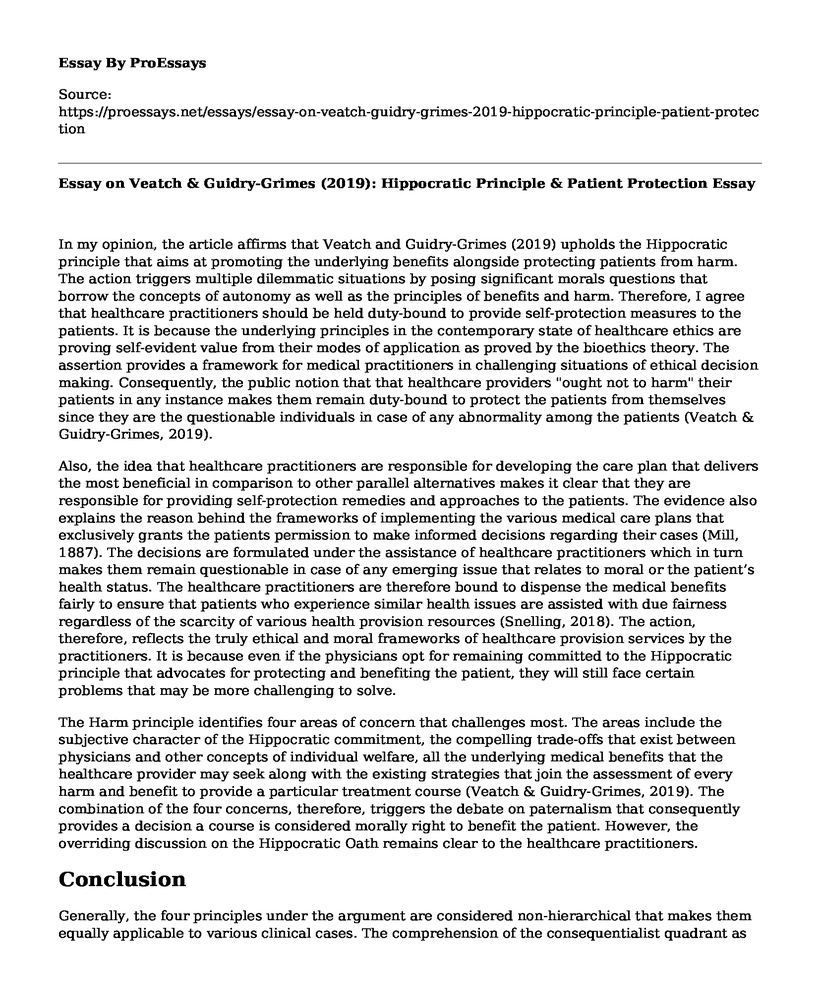In my opinion, the article affirms that Veatch and Guidry-Grimes (2019) upholds the Hippocratic principle that aims at promoting the underlying benefits alongside protecting patients from harm. The action triggers multiple dilemmatic situations by posing significant morals questions that borrow the concepts of autonomy as well as the principles of benefits and harm. Therefore, I agree that healthcare practitioners should be held duty-bound to provide self-protection measures to the patients. It is because the underlying principles in the contemporary state of healthcare ethics are proving self-evident value from their modes of application as proved by the bioethics theory. The assertion provides a framework for medical practitioners in challenging situations of ethical decision making. Consequently, the public notion that that healthcare providers "ought not to harm" their patients in any instance makes them remain duty-bound to protect the patients from themselves since they are the questionable individuals in case of any abnormality among the patients (Veatch & Guidry-Grimes, 2019).
Also, the idea that healthcare practitioners are responsible for developing the care plan that delivers the most beneficial in comparison to other parallel alternatives makes it clear that they are responsible for providing self-protection remedies and approaches to the patients. The evidence also explains the reason behind the frameworks of implementing the various medical care plans that exclusively grants the patients permission to make informed decisions regarding their cases (Mill, 1887). The decisions are formulated under the assistance of healthcare practitioners which in turn makes them remain questionable in case of any emerging issue that relates to moral or the patient’s health status. The healthcare practitioners are therefore bound to dispense the medical benefits fairly to ensure that patients who experience similar health issues are assisted with due fairness regardless of the scarcity of various health provision resources (Snelling, 2018). The action, therefore, reflects the truly ethical and moral frameworks of healthcare provision services by the practitioners. It is because even if the physicians opt for remaining committed to the Hippocratic principle that advocates for protecting and benefiting the patient, they will still face certain problems that may be more challenging to solve.
The Harm principle identifies four areas of concern that challenges most. The areas include the subjective character of the Hippocratic commitment, the compelling trade-offs that exist between physicians and other concepts of individual welfare, all the underlying medical benefits that the healthcare provider may seek along with the existing strategies that join the assessment of every harm and benefit to provide a particular treatment course (Veatch & Guidry-Grimes, 2019). The combination of the four concerns, therefore, triggers the debate on paternalism that consequently provides a decision a course is considered morally right to benefit the patient. However, the overriding discussion on the Hippocratic Oath remains clear to the healthcare practitioners.
Conclusion
Generally, the four principles under the argument are considered non-hierarchical that makes them equally applicable to various clinical cases. The comprehension of the consequentialist quadrant as labeled by the Hippocratic utility clarifies the role of physicians in protecting the patients hence rendering the utility a subjective concept. On most occasions, the practitioner’s judgment is the overruling factor thus making duty-bound to protect the patients.
References
Mill, J. S. (1887). On liberty. Longmans, Green. https://books.google.com/books?hl=en&lr=&id=ONWX2gHNR7IC&oi=fnd&pg=PA1&dq=On+Liberty++John+Stuart+Mill++The+&ots=hYFc4uGxs7&sig=LwTWf-hBxBIA7dYv8J8fjGgYYnE
Snelling, P. C. (2018). The subversion of Mill and the ultimate aim of nursing. Nursing Philosophy, 19(1), e12201. https://onlinelibrary.wiley.com/doi/abs/10.1111/nup.12201
Veatch, R. M., & Guidry-Grimes, L. K. (2019). The basics of bioethics. Routledge.
Cite this page
Essay on Veatch & Guidry-Grimes (2019): Hippocratic Principle & Patient Protection. (2023, Aug 08). Retrieved from https://proessays.net/essays/essay-on-veatch-guidry-grimes-2019-hippocratic-principle-patient-protection
If you are the original author of this essay and no longer wish to have it published on the ProEssays website, please click below to request its removal:
- Health System & Ethical Guidelines: Making Informed Choices - Essay Sample
- Paper Example on Providing Competent Client-Centered Care: Mrs. G's Case
- Essay Example on Curriculum Dev. & Challenges in Nursing Ed: Examining Trends & Issues
- Essay on Visiting Hours in ICU: Limitations on Family Care and Life-Critical Decisions
- Nursing School: Challenges & Rewards of an Educationally Arduous Experience - Essay Sample
- Paper Sample on HL Suffers GI Tract Infection: Symptoms, Treatment, Rationale
- Essay Example on CLABSIs: Nursing Ethics and Theory in Practice







